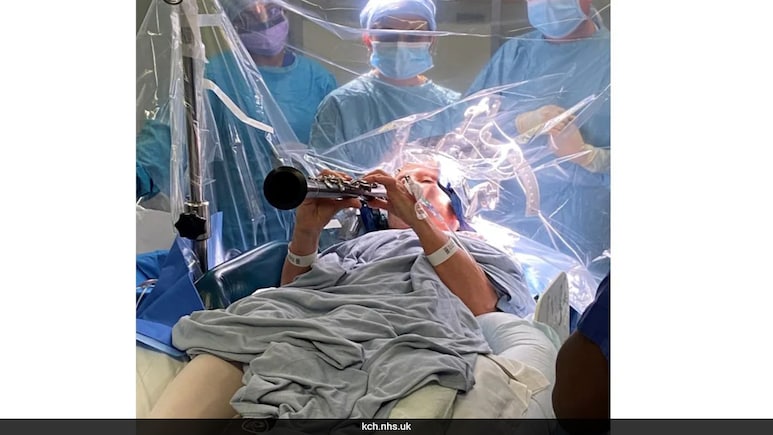
In an extraordinary moment of medical and musical harmony, a 65-year-old Parkinson's patient played the clarinet during brain surgery - helping doctors fine-tune her treatment in real time, . Denise Bacon, a retired speech and language therapist from Crowborough, East Sussex, has lived with Parkinson's since 2014, battling stiffness and slow movement that robbed her of many joys, including music.
But during a four-hour Deep Brain Stimulation (DBS) surgery at King's College Hospital, Denise performed on her clarinet while neurosurgeons implanted electrodes into her brain. The surgical team, led by Professor Keyoumars Ashkan MBE, used her live musical feedback to adjust the DBS device, which sends electrical impulses to specific brain regions to reduce Parkinson's symptoms.
Supported by a multidisciplinary team, the operation delivered immediate results - Denise's finger dexterity improved noticeably, allowing her to play with surprising fluidity even during surgery. The emotional moment not only marked a medical milestone but also brought back a piece of her identity.
Professor Ashkan, said: "Deep Brain Stimulation, where stimulating electrodes are placed into the deep structures of the brain, is a long-established procedure to improve motor symptoms in patients with movement disorders.
"Holes half the size of a five pence piece were made in Denise's skull after a frame with precise coordinates was placed on Denise's head, acting as a sat nav to guide us to the correct positions within the brain to implant the electrode."
"Once the electrodes were in place on the left side of Denise's brain, the current was switched on and an immediate improvement was noted in hand movements on her right side. The same happened on her left side when we implanted electrodes on the right side of her brain," Professor Keyoumars Ashkan added.
"As a keen clarinettist, it was suggested Denise bring her clarinet into the operating theatre to see whether the procedure would improve her ability to play, which was one of Denise's main goals for the surgery. We were delighted to see an instant improvement in her hand movements, and therefore her ability to play, once stimulation was delivered to the brain."
Amateur musician Denise, who played clarinet in the East Grinstead Concert Band until she had to stop five years ago due to her Parkinson's symptoms, was given a local anaesthetic to numb her scalp and skull (the brain itself has no pain receptors) but remained awake during the procedure so her symptoms could be monitored throughout.
She said: "I remember my right hand being able to move with much more ease once the stimulation was applied, and this in turn improved my ability to play the clarinet, which I was delighted with.
"I'm already experiencing improvements in my ability to walk, and I'm keen to get back in the swimming pool, and on the dance floor to see if my abilities have improved there."
Denise opted for the rechargeable type of pulse generator battery that is implanted in her chest, which can last up to 20 years before it requires replacing, delivering a continuous electrical current to her brain. The innovative generator will monitor her brain activity and can help automatically adjust the stimulation when needed.
Track Latest News Live on NDTV.com and get news updates from India and around the world

